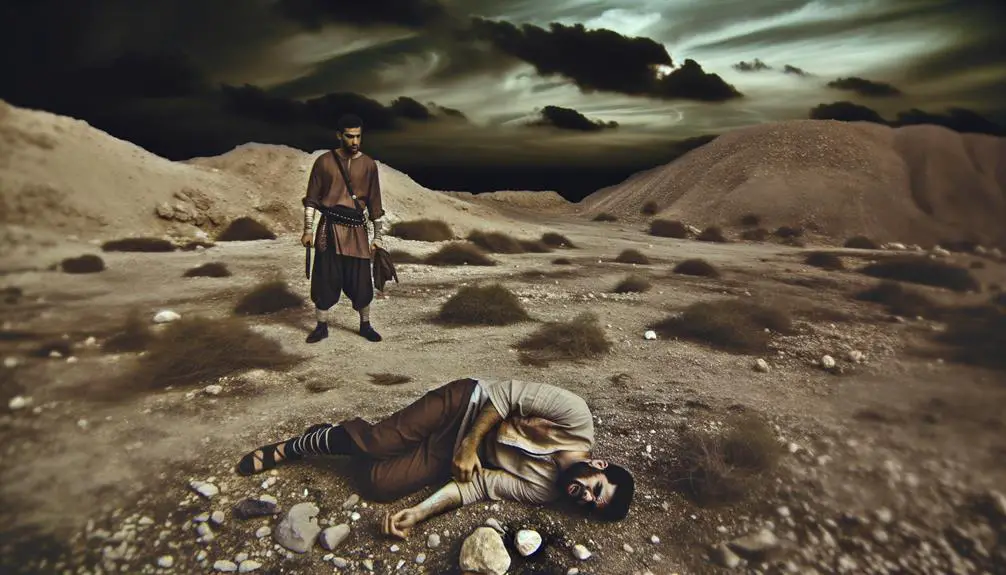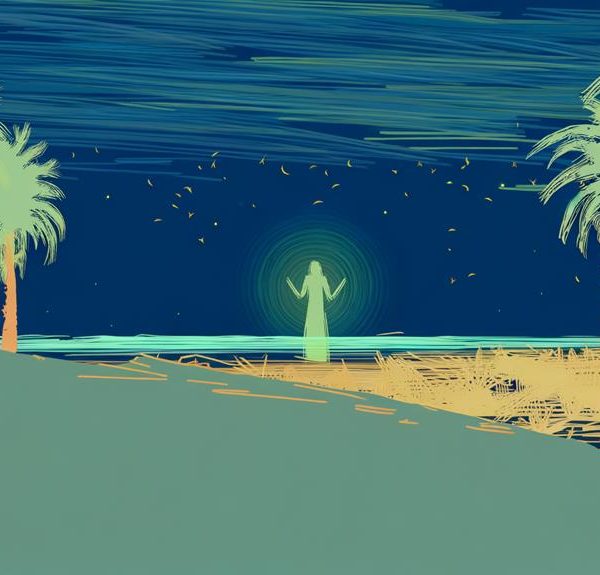Discover why Cain's deep jealousy led him to commit the ultimate betrayal against his brother Abel in this biblical tale of morality and divine judgment.

Did Cain Kill Abel in the Bible
Yes, in the Bible, Cain did kill his brother Abel. This act of fratricide is the culmination of deep-seated jealousy and an emblematic struggle between differing lifestyles: Cain's agriculture versus Abel's pastoralism. The narrative, laden with themes of envy, divine favor, and moral failure, highlights the profound consequences of Cain's actions, both divinely and socially. Abel's offerings, marked by sincerity and piety, stood in stark contrast to Cain's, leading to divine preference that fueled Cain's fatal wrath. Exploring this story further reveals broader implications about human nature and morality, particularly in how individuals handle divine judgment and sibling rivalry.
Key Takeaways
- Yes, in the Bible, Cain committed the first murder by killing his brother Abel.
- Cain's act was motivated by jealousy and resentment towards Abel.
- God had favored Abel's offering over Cain's, which intensified Cain's feelings of rejection.
- After the murder, God punished Cain with a life of wandering but marked him for protection.
- The story of Cain and Abel is found in the Book of Genesis, chapter 4.
The Biblical Narrative

In the biblical narrative, Cain's act of fratricide emerges as a profound illustration of moral failure and divine judgment. Understanding this event requires a grasp of both its genealogical context and agricultural backdrop. You're delving into a story where the dynamics of the first family set a precedent for humanity's moral narratives.
Cain and Abel, sons of Adam and Eve, represent more than mere siblings; they embody the burgeoning divergences within human civilization. The genealogical context here is pivotal, as it ties Cain's personal moral failure to the broader human story. Cain, as the elder, might have been seen as the bearer of Adam's legacy, yet his actions redefined this inheritance.
The agricultural backdrop further enriches this narrative. Abel, a keeper of sheep, and Cain, a tiller of the ground, symbolize the division between pastoral and agricultural lifestyles. This distinction isn't just occupational but deeply symbolic. The fruits of their labors were meant to reflect their spiritual states, yet Cain's offering fails to win divine favor, which exacerbates his moral descent.
Your exploration of these layers reveals how Cain's deeds are interwoven with existential themes of envy, labor, and divine favor, set against the dawn of human society.
Cain's Motivation
You may find it intriguing to ponder the factors that propelled Cain to commit such a drastic act against Abel. It appears that jealousy over God's preferential treatment of Abel's offering played a significant role. Additionally, questions arise about whether perceived divine favoritism and Cain's own insecurities fueled his wrathful decision.
Jealousy Sparks Tragic Action
Jealousy, a pervasive human emotion, drove Cain to commit the first recorded act of murder. This intense feeling burgeoned from a complex interplay of sibling rivalry and perceived inequality, manifesting in a fatal outcome for Abel. You might consider how this dynamic is not merely a biblical anecdote but a reflection of broader human tendencies. The emotional consequences of such rivalry are profound, influencing behaviors in ways that can escalate to irreversible actions. Cain's inability to manage his feelings of inadequacy and resentment towards his brother highlights a fundamental psychological struggle. This narrative serves as a cautionary tale about the destructive potential of unchecked jealousy and rivalry within the closest of relationships, particularly among siblings.
God's Favoritism Questioned
Cain's perception of divine favoritism further fueled his resentment, compelling a deeper exploration of his motivations. You're now faced with the question: How did this perception affect Cain, and what does it reveal about the notion of divine impartiality? Here are key points to ponder:
- Initial Rejection: The initial offering rejection by God might have been perceived by Cain not just as a personal failure, but as a divine preference for Abel.
- Feeling of Injustice: This rejection likely intensified feelings of injustice, leading Cain to question the fairness of divine choices.
- Response to Favoritism: Cain's response to perceived favoritism illustrates the profound consequences that perceived divine bias can have on human behavior.
- Divine Impartiality Questioned: The story challenges readers to reflect on the nature of divine impartiality and its implications for human interactions.
This analysis helps us understand the dynamics of favoritism consequences in biblical narratives.
Insecurity Leads to Wrath
Amidst his growing feelings of rejection, Cain's insecurity transformed into wrath, directly influencing his tragic actions. Your understanding of this biblical narrative can be deepened by examining the psychological underpinnings of Cain's behavior. Insecurities, if left unchecked, can escalate into violent emotions and actions. Implementing emotional management techniques might have mitigated the intensity of Cain's wrath. Moreover, self-awareness training could have provided Cain with insights into his own emotional state, potentially curbing the jealousy and resentment that fueled his rage towards Abel. This episode underscores the importance of emotional intelligence as a tool for preventing destructive outcomes. It's insightful to ponder how different the story might have been had Cain possessed strategies for managing his emotional responses.
Abel's Innocence
You'll find that Abel's innocence in the biblical narrative is highlighted by his virtuous character. In contrast to Cain, Abel's actions reflect compliance and piety, which underscores the tragedy of his untimely death. This stark disparity between the brothers sets the stage for exploring the profound implications of their story on themes of jealousy and divine favor.
Abel's Virtuous Character
Abel's character, often overshadowed by his tragic fate, exemplifies virtue and innocence, pivotal in understanding the dynamics of his story within biblical texts. His life as a shepherd and his approach to sacrificial offerings highlight his purity and dedication:
- Shepherd's Life: Abel chose a life of caring for sheep, symbolizing gentleness and a peaceful existence, contrasting with more aggressive livelihoods.
- Sacrificial Offerings: He offered the best portions of his flock to God, reflecting his deep faith and commitment.
- Moral Integrity: Abel's actions were consistently just and sincere, devoid of deceit.
- Humility: Despite his merits, he maintained a low profile, focusing on his duties and worship without seeking acclaim or conflict.
Analyzing these traits helps illustrate why Abel's story is so compelling and instructive.
Contrast With Cain
While Abel's life was marked by virtue and humility, Cain's choices reflect a starkly contrasting moral trajectory. You can clearly see the divergence in their paths by examining their roles and attitudes within the broader agricultural context. Abel's role as a shepherd, tending to flocks, symbolizes a nurturing and caretaker approach, aligning with his innocent and virtuous demeanor. In contrast, Cain's work as a farmer suggests a dominion over the land, perhaps cultivating not only crops but also a growing resentment that is symptomatic of sibling rivalry.
Aspect |
Abel |
Cain |
|---|---|---|
Occupation |
Shepherd |
Farmer |
Offering |
Favored by God |
Not favored |
Character |
Humble, Innocent |
Resentful, Proud |
Relation |
Victim |
Aggressor |
Symbolism |
Caretaker, Nurturer |
Dominion, Control |
This table helps illustrate the stark moral contrasts between the two brothers.
Abel's Tragic Fate
Despite his innocence and humble demeanor, Abel's life met a tragic end when he was murdered by his brother Cain. This incident, recorded in the biblical narrative, holds significant implications both historically and agriculturally. Here's an analytical look at the situation:
- Historical Accuracy: The account of Abel's death provides insights into early fraternal relationships and possibly the earliest recorded instance of homicide, reflecting deep-rooted social and familial conflicts.
- Symbolism of Sacrifice: Abel's choice of offering, a lamb, symbolizes purity and acceptance, contrasting with Cain's rejected agricultural produce, highlighting the spiritual dimensions of their offerings.
- Agricultural Implications: Cain's background as a farmer might suggest early tensions between nomadic herders and settled agriculturists, a theme recurring throughout ancient civilizations.
- Legacy of Innocence: Abel's untimely death immortalizes him as a figure of innocence and victimhood in religious and cultural discourses, influencing art, literature, and theology.
God's Reaction
God's response to Cain's actions reveals His dedication to justice, yet also His mercy towards the sinner. In the biblical narrative, this dual approach is evident as God confronts Cain after the murder of Abel. The dialogue between God and Cain underscores an important aspect of divine justice: accountability. Cain is directly questioned by God, 'Where is your brother Abel?' which signifies that evasion of responsibility is not tolerated. However, the severity of the punishment also brings to light the complexity of divine justice.
Cain is not sentenced to death but is marked with a life of wandering, a punishment that reflects both the seriousness of his crime and the continuation of divine mercy. This mark, often interpreted as a protective sign, paradoxically safeguards Cain from potential harm from others, thus presenting a nuanced picture of punishment. It serves as a deterrent against further violence and a perpetual reminder of his actions.
This narrative invites you to ponder the balance between justice and mercy within the framework of divine governance. The severity of Cain's punishment, coupled with the protective aspect, illustrates a sophisticated approach to correcting wrongdoing while still offering a path for redemption.
Moral Implications

Reflecting on God's response to Cain, one must consider the broader moral implications of this biblical account. The story of Cain and Abel isn't just an isolated narrative; it's a complex exploration of ethical debates and societal impact that resonates through the ages.
Here are several points to ponder:
- Responsibility and Accountability: Cain's actions underline the human duty to be accountable for one's actions. This resonates in both personal ethics and societal laws, emphasizing that actions have consequences.
- Jealousy and Conflict: The root causes of Cain's jealousy and subsequent violence highlight how unchecked negative emotions can lead to societal harm. This teaches the importance of managing emotions and resolving conflicts peacefully.
- Divine Justice vs. Human Justice: The divine response to Cain's actions prompts us to think about the balance between divine justice and human legal systems. How does divine judgment influence or reflect our own legal principles?
- Forgiveness and Punishment: The narrative also explores the tension between punishment and the opportunity for redemption. It raises questions about the adequacy and fairness of penalties, influencing ethical debates on justice and rehabilitation.
These elements underscore the story's ongoing relevance and its impact on shaping ethical norms and societal values.
Theological Interpretations
How do various theological interpretations analyze the story of Cain and Abel, especially considering divine intent and human free will? The narrative raises profound questions about divine justice and the possibility of redemption. Theologically, many scholars argue that the episode underscores the complexity of God's justice, which is not merely punitive but also corrective. Divine justice, within this framework, is seen as a mechanism for maintaining moral order while allowing room for human agency.
You'll find that interpretations often hinge on the balance between divine sovereignty and human responsibility. Cain's choice to murder Abel, despite God's warning, illustrates the exercise of free will in the face of clear divine guidance. Yet, the aftermath of the crime, where God marks Cain not only as a punishment but also as a protective measure, introduces a nuanced view of divine justice. This mark can be perceived as a symbol of God's ongoing engagement with humanity, a blend of justice and mercy, highlighting the redemption possibility even for those who have gravely sinned.
Thus, the story of Cain and Abel serves as a theological reflection on how divine justice operates alongside human freedom, emphasizing that redemption remains accessible, albeit complex, within the framework of divine-human interactions.
Lessons for Today

Building on this understanding of divine justice and human freedom, let's examine how the story of Cain and Abel offers relevant lessons for contemporary ethical dilemmas. The narrative's modern relevance is undeniable, providing a framework for ethical discussions in various contexts. Here are four key lessons you can derive:
- Responsibility for Actions: Cain's decision to murder Abel highlights the importance of personal accountability in ethical behavior. It's important to recognize that your actions have consequences, and ethical living requires taking responsibility for them.
- Jealousy and Its Destructive Outcomes: The story illustrates how unchecked jealousy can lead to severe consequences. In today's context, this serves as a warning against allowing envy to cloud judgment or spur harmful actions.
- Divine Justice and Human Judgment: Cain's punishment by God underscores the role of divine justice in moral narratives, reminding you that ethical lapses often carry inevitable repercussions, even if human justice systems fail.
- The Role of Forgiveness and Reconciliation: Although the narrative focuses more on the consequences of Cain's actions, it also opens discussions on the potential for forgiveness and reconciliation in the face of wrongdoing, an essential aspect of ethical discussions today.
These lessons underscore the need to address ethical challenges thoughtfully and responsibly in your daily interactions and decision-making processes.
Further Reflections
Exploring further into the story's implications, it is crucial to contemplate how Cain's actions and their divine repercussions shape our understanding of moral accountability. The narrative does not explicitly detail Cain's remorse, but the mark set upon him by God suggests a complex interaction between divine justice and mercy. This mark, often interpreted as both a punishment and a protective sign, underscores a dual approach to sin and its consequences in societal contexts.
You must consider the societal impact of Cain's deed and its aftermath. His actions introduce the concept of personal guilt and societal repercussions for violent acts, setting a precedent in human social structures. The spread of violence and the development of societal norms around punishment and forgiveness can be seen as a ripple effect from this foundational event. Cain's experience encapsulates a critical lesson on the consequences of sin, not only on an individual level but also within the broader community.
Thus, in reflecting on this story, it is crucial to recognize the layers of meaning behind Cain's actions and their effects. These insights contribute to a deeper understanding of how early biblical narratives can influence contemporary notions of justice, morality, and social responsibility.
Frequently Asked Questions
What Was the Occupation of Cain and Abel?
In the midst of ancient sibling rivalry, Cain embraced agricultural practices as a farmer, while Abel tended to flocks, embracing pastoral life. This division of labor reflects early societal roles and economic diversification.
Did Cain Have a Family After the Incident?
Yes, after the incident, Cain had a family, establishing a lineage detailed in the Bible. Cain's descendants are listed, showing a family tree that includes notable figures like Enoch and Lamech.
How Did Other Cultures Interpret the Cain and Abel Story?
Isn't it fascinating how stories resonate? Various cultures interpret the Cain and Abel narrative through rich cultural symbolism and mythological parallels, analyzing themes of envy, redemption, and moral conflict in a scholarly, objective manner.
Are There Archaeological Evidences Related to Cain and Abel?
There's no conclusive archaeological evidence or historical validation related to Cain and Abel. The story's genetic implications are speculative, primarily serving as a moral and cultural teaching rather than an historical account.
What Psychological Analyses Exist on Cain's Behavior?
You're diving into the stormy seas of sibling rivalry and moral conflict. Scholars analyze Cain's behavior as a deep-seated psychological struggle, illuminating the darker facets of human nature and familial bonds.



Sign up